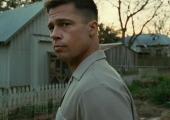It's a problem many a cash-strapped Premier League football manager is familiar with. The über-teams like Chelsea and Manchester United have loads more money than you, and can simply spend you out of contention. Over in California, this was what was happening to the Oakland A's baseball team as they headed into the 2002 season, as their top players were picked off by wealthier squads and they couldn't afford to replace them with stars of equal quality. "We're organ donors for the rich," as Oakland's general manager Billy Beane puts it.
A true story based on the bestselling book by bond-trader-turned-author Michael Lewis, Moneyball is a baseball movie that breaks the mould of baseball movies, just as Beane himself upended ingrained precepts of baseball management as he set about dragging his team out of the low-rent mire. Instead of the starry-eyed wish fulfilment of The Rookie or the nostalgia of Field of Dreams (even if Beane is fond of wondering ironically, "How can you not be romantic about baseball?"), it's a hard-boiled account of how he realised that tradition wasn't going to save him, and so pioneered a radical new system for building success. It's baseball's own Winning Ugly.
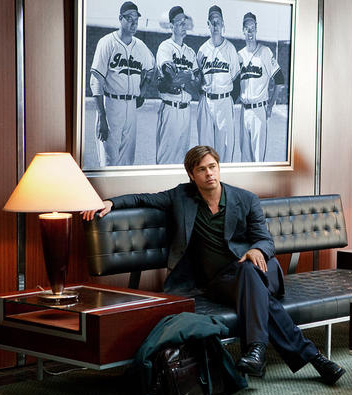 Among the joys the film affords is the way it gives Brad Pitt an opportunity to stretch out and display a battle-hardened maturity previously not associated with the telegenic star. As Beane, he combines laconic pragmatism and bloody-minded determination, while deriving buckets of motivational fuel from his frustrated past as a hotly tipped baseball star who never delivered on his potential. Maybe there's an implicit wry contrast between Pitt's role here and his sometime mentor Robert Redford's portrayal of baseball hero Roy Hobbs in The Natural.
Among the joys the film affords is the way it gives Brad Pitt an opportunity to stretch out and display a battle-hardened maturity previously not associated with the telegenic star. As Beane, he combines laconic pragmatism and bloody-minded determination, while deriving buckets of motivational fuel from his frustrated past as a hotly tipped baseball star who never delivered on his potential. Maybe there's an implicit wry contrast between Pitt's role here and his sometime mentor Robert Redford's portrayal of baseball hero Roy Hobbs in The Natural.
On a visit to the Cleveland Indians to try to buy players (pictured above), Beane is treated with contempt, but with brilliant intuition he snatches away the Indians' geeky theoretician Peter Brand (Jonah Hill). He's an economist with a degree from Yale who has developed a new method of assessing the value of baseball players by using computerised analysis of their performances. He hadn't convinced Cleveland, but Beane perceives that this could be his lifeline. The clinching evidence is when Brand's assessment of Beane's past abilities as a player corresponds with the deflating reality rather than the hopeful hype he was fed.
Using Brand's calculations, he recruits a seemingly motley crew of lame, over-the-hill or temperamental players written off by other teams, and sets about proving that they can become match-winners when deployed in ways that maximise their overlooked strengths. "We are card counters at the blackjack table," is how Beane sums up their audacious plan to subvert the supposed natural order of things. And, crucially, his unfancied squad comes cheap.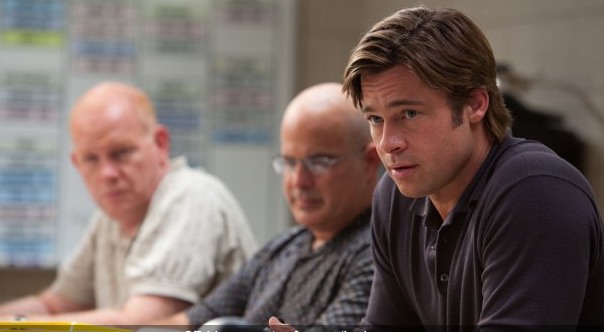
Director Bennett Miller gives the film ballast and guts with his unsparing depiction of the decrepit male gerontocracy running Major League baseball (pictured above), its authenticity enhanced by the casting of several real-life professional scouts. Beane's outlandish new theories are treated like Satanists at a prayer meeting, and no one is more hostile than Oakland's field manager Art Howe (played like a dour, thick-necked old Marine colonel by Philip Seymour Hoffman [pictured below]). The story of how the underdogs battled this ossified hierarchy with a mixture of brains and bravado is a sure-fire winner, and the physical contrast between the still dashing Brad and Hill's bespectacled swot lends an unlikely-lads charm to the proceedings. Scenes where Beane nonchalantly sends the flabbergasted Brand to sack failing Oakland players lob some enjoyable black comedy into the mix, while Beane's motormouth, take-it-or-leave-it phone calls as he hustles rival team managers are a recurring motif.
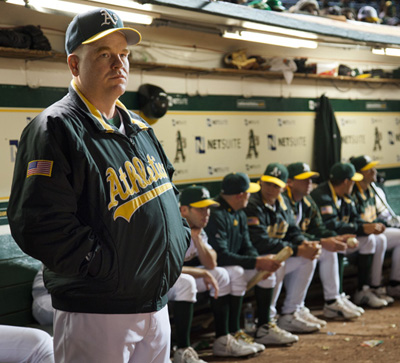 However, although screenwriters Aaron Sorkin and Steven Zaillian have done their persuasive best to put characterisation and the long climb against the odds centre stage, at some point the fact has to be faced that at its core this is a story about the analysis of reams of baseball statistics. I had the vague notion that there was some similarity between baseball and cricket - they both have batters, fielders and pitchers, for instance, if we make allowances for transatlantic nomenclature - but baseball's fixation with blizzards of stats and averages might tax even the intellectual resources of Stephen Hawking. The game's terminology (walk, bunt, top of the ninth etc) may also present a few problems to the European viewer, since you can lose sight of the keen edge of the action.
However, although screenwriters Aaron Sorkin and Steven Zaillian have done their persuasive best to put characterisation and the long climb against the odds centre stage, at some point the fact has to be faced that at its core this is a story about the analysis of reams of baseball statistics. I had the vague notion that there was some similarity between baseball and cricket - they both have batters, fielders and pitchers, for instance, if we make allowances for transatlantic nomenclature - but baseball's fixation with blizzards of stats and averages might tax even the intellectual resources of Stephen Hawking. The game's terminology (walk, bunt, top of the ninth etc) may also present a few problems to the European viewer, since you can lose sight of the keen edge of the action.
But such caveats aside, what carries Moneyball triumphantly to the tape is Miller's refusal to lapse into rose-tinted melodrama, a stance exemplified by his use (with one prominent exception) of real game footage instead of the usual sports movie re-enactments. Even when the A's have won a historic 20 matches on the trot and it looks like there's a Seabiscuit-style climax looming, Miller still has an ace and a couple of jokers up his sleeve. Despite its Academy-pleasing cast, this manages to be film-making a little bit outside the Hollywood box.
BRAD PITT’S BIG MOMENTS
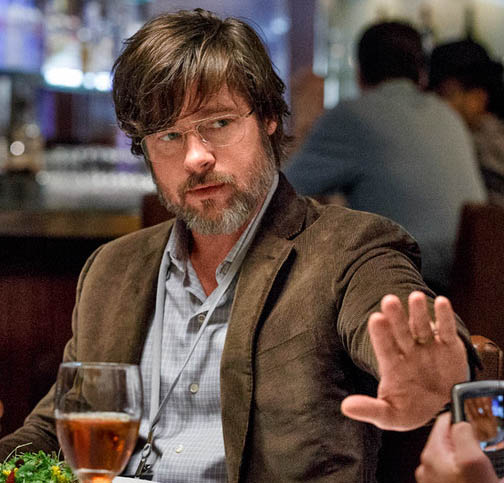 Allied. Doomed but entertaining attempt to revive 1940s Hollywood
Allied. Doomed but entertaining attempt to revive 1940s Hollywood
Fury. David Ayer and Brad Pitt take the war film by the scruff of the neck
Inglorious Basterds. Pitt is gloriously absurd in Tarantino WW2 alternative history
Killing Them Softly. Brad Pitt cleans up an almighty mess in Andrew Dominik’s high-calibre crime ensemble
The Big Short. Pitt’s on the money as director Adam McKay successfully makes a drama out of a crisis
The Counsellor. Ridley Scott ensemble thriller is nasty, brutish and short or mysterious, upsetting and alluring
The Tree of Life. Terrence Malick’s elliptical epic leads us through time, space and one family’s story
PLUS ONE TURKEY
World War Z. It's World War with a Zee as Brad Pitt battles the undead and a zombie script
Overleaf: watch the trailer to Moneyball
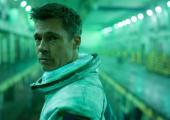

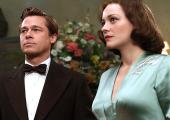
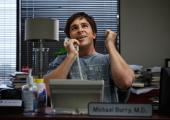
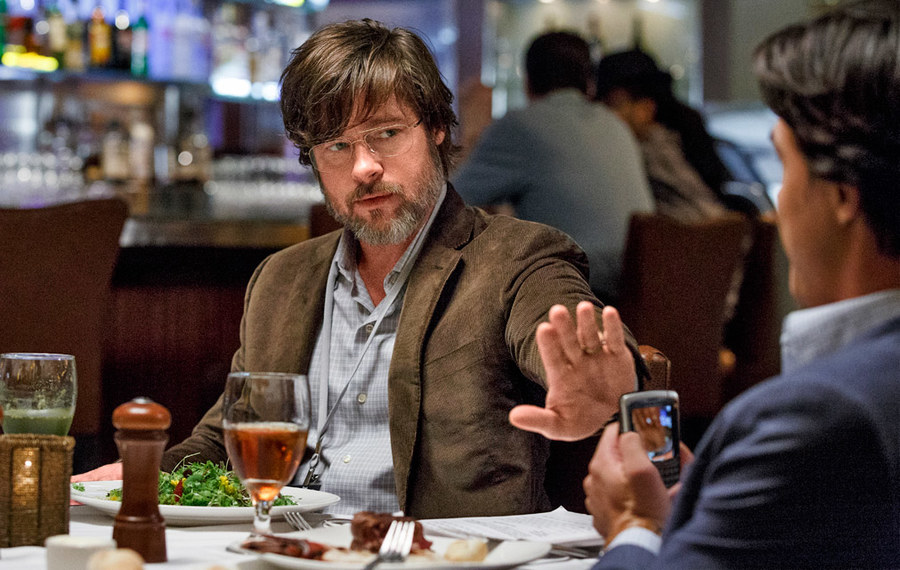 But that was only the start. In order to exploit his startling insight, Burry had to persuade the bankers to create the credit default swap, whereby he could bet large on the collapse of the US housing market. Since everybody had convinced themselves that the housing business, anchored on the personal investments of millions of honest Americans, could never go wrong, they were delighted to oblige.
But that was only the start. In order to exploit his startling insight, Burry had to persuade the bankers to create the credit default swap, whereby he could bet large on the collapse of the US housing market. Since everybody had convinced themselves that the housing business, anchored on the personal investments of millions of honest Americans, could never go wrong, they were delighted to oblige.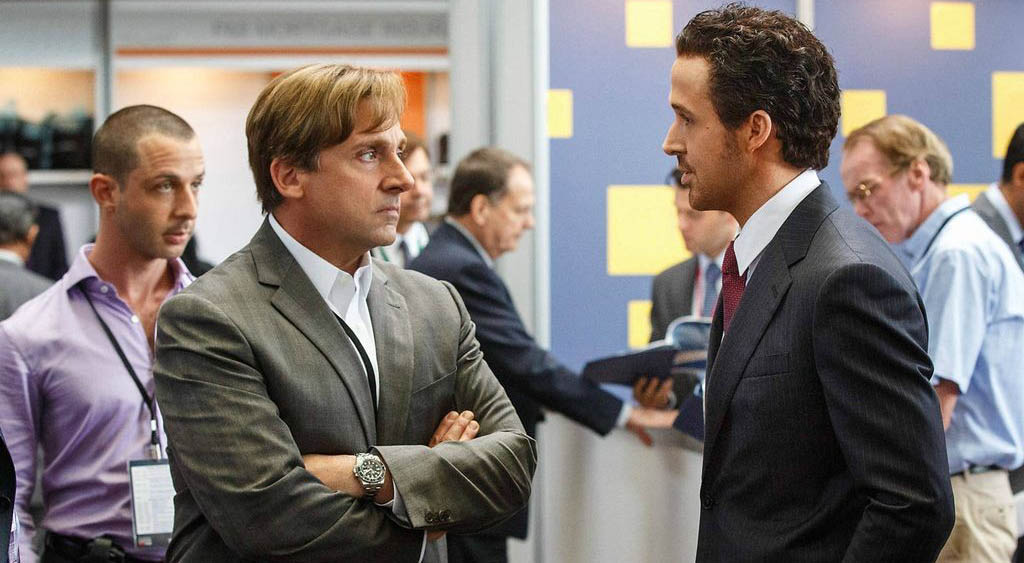 That's just one of several devices the director shuffles to fend off glazed-eye syndrome. On-screen text might pop up helpfully, while spliced-in flashes of pop-culture imagery add a subliminal timeline. A deadpan sequence of how staid and boring banking used to be before the 1980s evokes a sleepy world of sludge-green and taupe, where bankers were mostly at lunch and two per cent was considered a handsome profit. The best trick is the unashamedly gratuitous introduction of celebrities to explain thorny plot points – "to tell you about subprime mortgages, here's Margot Robbie in a bubble-bath", or svelte popstrel Selena Gomez teaming up with economist Richard Thaler to give y'all the lowdown on "Synthetic CDOs".
That's just one of several devices the director shuffles to fend off glazed-eye syndrome. On-screen text might pop up helpfully, while spliced-in flashes of pop-culture imagery add a subliminal timeline. A deadpan sequence of how staid and boring banking used to be before the 1980s evokes a sleepy world of sludge-green and taupe, where bankers were mostly at lunch and two per cent was considered a handsome profit. The best trick is the unashamedly gratuitous introduction of celebrities to explain thorny plot points – "to tell you about subprime mortgages, here's Margot Robbie in a bubble-bath", or svelte popstrel Selena Gomez teaming up with economist Richard Thaler to give y'all the lowdown on "Synthetic CDOs".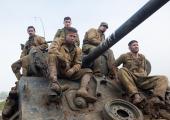
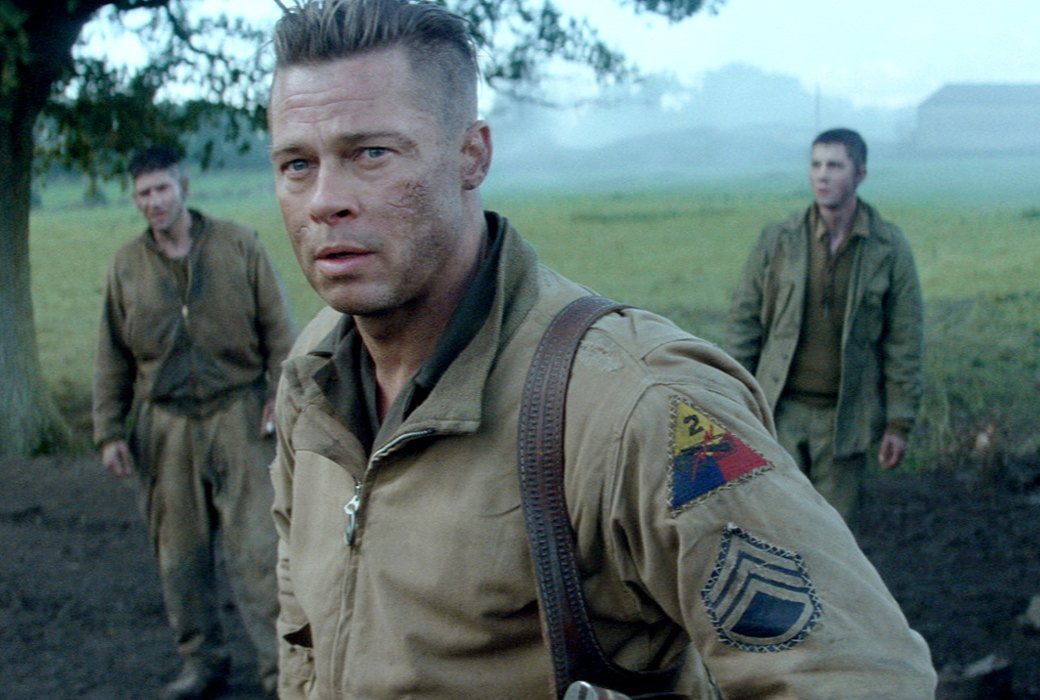 Don's replacement for his fifth man, decapitated by enemy fire, is the baby-faced Norman Ellison (Logan Lerman), who can type 60 words a minute - not terribly useful given the context - and no-one disguises their disappointment at the new addition to the crew. Told not to get too close to anyone, Norman's ominous and unbelievably disgusting first assignment is to clean his predecessor's blood and bodily fragments from inside the armoured vehicle. Fury is set significantly in the Sherman tank these men call home; snapshots and girly pictures are displayed alongside the Nazi trophies they've ripped from corpses.
Don's replacement for his fifth man, decapitated by enemy fire, is the baby-faced Norman Ellison (Logan Lerman), who can type 60 words a minute - not terribly useful given the context - and no-one disguises their disappointment at the new addition to the crew. Told not to get too close to anyone, Norman's ominous and unbelievably disgusting first assignment is to clean his predecessor's blood and bodily fragments from inside the armoured vehicle. Fury is set significantly in the Sherman tank these men call home; snapshots and girly pictures are displayed alongside the Nazi trophies they've ripped from corpses. Allied
Allied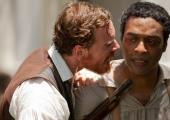
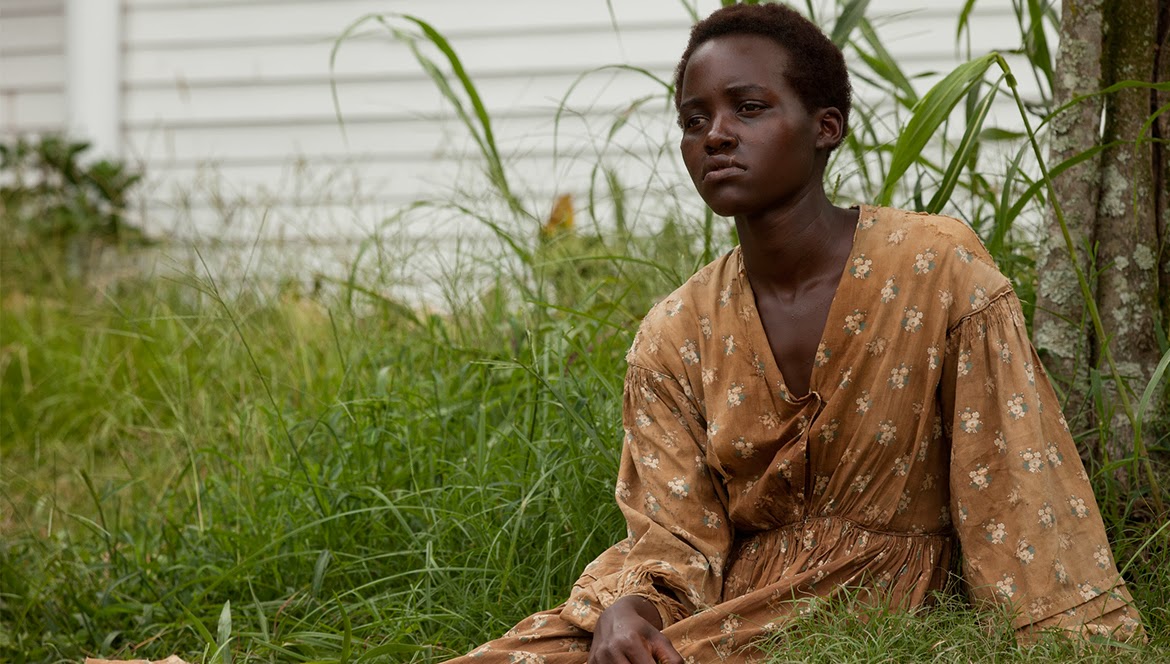 Most memorably and extensively, the film documents Solomon's suffering at the hands of Edwin Epps, a drunken brute played with extraordinary ferocity by
Most memorably and extensively, the film documents Solomon's suffering at the hands of Edwin Epps, a drunken brute played with extraordinary ferocity by 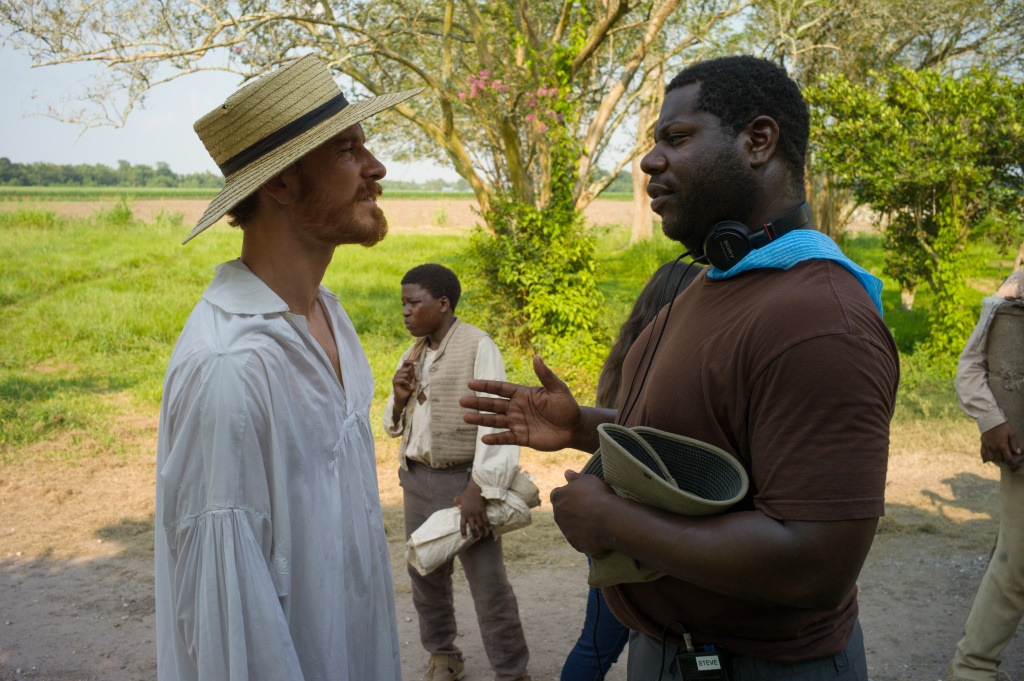 12 Years a Slave is a true horror story which rages at the obvious injustice of slavery and the horrendous hardships suffered by slaves themselves but, perhaps most remarkably, through Epps and those like him, McQueen draws out the complex reactions of white plantation owners and workers. It shows the detrimental impact of slavery on all those it touches, not just the people it subjugates. It illustrates how society at large is poisoned, how those who keep slaves are rendered crueller and lesser, tortured by both their own capacity for sadism and their inescapable humanity, and how few had the courage to challenge the miserable status quo.
12 Years a Slave is a true horror story which rages at the obvious injustice of slavery and the horrendous hardships suffered by slaves themselves but, perhaps most remarkably, through Epps and those like him, McQueen draws out the complex reactions of white plantation owners and workers. It shows the detrimental impact of slavery on all those it touches, not just the people it subjugates. It illustrates how society at large is poisoned, how those who keep slaves are rendered crueller and lesser, tortured by both their own capacity for sadism and their inescapable humanity, and how few had the courage to challenge the miserable status quo.
 Meanwhile, peculiar gangster type Reiner (Javier Bardem) and his even stranger girlfriend, Malkina (Cameron Diaz, pictured with Cruz), have so much money to burn that she has silver fingernails and they spend the whole day watching a pair of tame cheetahs chase hares over the plains. A deeper discussion includes the line, "I think truth has no temperature." Hearing this, the audience know they're in trouble. But as this is McCarthy, we're attempting art, so we'll hang on. Oh, that “car scene” – Diaz’s character rubs herself against a windscreen - is not as shocking as it sounds. Reiner’s reaction, however, is worth the ticket price. The whole sequence is sexy, off-putting and hilarious.
Meanwhile, peculiar gangster type Reiner (Javier Bardem) and his even stranger girlfriend, Malkina (Cameron Diaz, pictured with Cruz), have so much money to burn that she has silver fingernails and they spend the whole day watching a pair of tame cheetahs chase hares over the plains. A deeper discussion includes the line, "I think truth has no temperature." Hearing this, the audience know they're in trouble. But as this is McCarthy, we're attempting art, so we'll hang on. Oh, that “car scene” – Diaz’s character rubs herself against a windscreen - is not as shocking as it sounds. Reiner’s reaction, however, is worth the ticket price. The whole sequence is sexy, off-putting and hilarious.
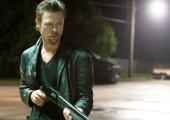
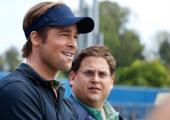
 Among the joys the film affords is the way it gives
Among the joys the film affords is the way it gives 
 However, although screenwriters
However, although screenwriters 